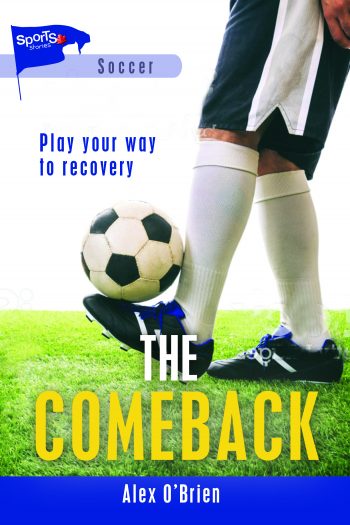The Comeback
Genre: mental health | sports

Author: Alex O’Brien
Publisher: Lorimer
On the surface, fourteen-year-old Chris is pretty average, playing hockey and having friends. But underneath it all, Chris is depressed, full of self-blame and negative thoughts. He quits his hockey team, feeling he has let them down, but his doctor suggests that he should pick up another sport. Chris starts playing soccer, and the positive benefits of sport start to take effect: He is motivated and has fewer self-doubts. But former hockey teammate Trent is on the team, and his suspicions about Chris and his emotional state threaten Chris's acceptance and recovery. When Chris and Trent are chosen for a team to play in a summer tournament, Chris decides to keep his depression a secret. But will rumour and stigma about his condition make him relapse and turn his own team against him?
left no-repeat;left top;; autoWhat a great idea, presenting a fast-paced, easy-to-read sports story that just happens to have a character who has been suffering from depression. Bravely, Chris attempts a comeback, and bravely, he stands up in front of his teammates to explain what exactly depression is and why it should not stop him from doing his best at soccer in the coming season. Nor, he emphasizes, should it prompt them to treat him with kid gloves. Of course, not all his fellow players get it or accept it, and one in particular harasses, bullies, spreads false rumours and turns others against him. Also, Chris has lingering struggles, both physical tiredness and the habit of letting discouragement get to him. But he battles this with “self talk,” or giving himself silent pep talks at key moments – and it works. Which means, readers gain important insight into tackling mood or bullying issues they may have.
Passing by Chris, Trent snarled, “I hope you’ve taken your happy pill. We can’t afford to lose.”
“I told you,” said Chris. “I’m not on meds.”
“Oh, well, maybe you should be,” said Trent. “Remember, field goals don’t count in soccer.”
He doesn’t care that I set up his winning goal last game, thought Chris. All he remembers is one bad shot. I’m not going to let him get to me. This game’s too important.
The story is perhaps nine-parts sports, and one-part mental-health issue, so it’s not the kind of novel a skeptical preteen will instantly reject as too weird, too touchy-feely, too agenda-laden. On the other hand, the depression aspect is introduced very early on, so there’s nothing being snuck in, either.
The writing is as ideal for struggling readers who appreciate short, crisp sentences, easy vocabulary and lots of action. As for the sports portion of the plot, it’s fast and authentic with highlights of humor.
The Hotspurs didn’t give up. Quinn passed to Reo. Reo dribbled while Chris fought to get open. Reo sent Chris a lead pass that Chris ran to meet. He dribbled down the side. He saw Luca heading towards the goal. Chris timed a perfect cross. His kick sailed to the far post. Luca raced in and headed the ball into the net.
It’s great that the characters are diverse. And cool that readers learn such things as the fact that medication isn’t always a part of recovery, and depression is different than just feeling sad. Perhaps most impressive is how Chris doesn’t just remind himself to not let berating teammates get to him; he literally talks the talk when it comes to showing how he’s fighting three things at once: the need for self-talk to avoid the danger of a return to depression, the physical tiredness that lingers as he comes out of it, and the prejudice and misinformation he must counter amongst his teammates.
What’s unrealistic is how two different coaches instantly embrace his condition and actively encourage him, and how 99 per cent of his teammates do the same. But maybe this is tomorrow’s real world -- if important, well-written books like this circulate amongst today’s readers.
-P.W.
left no-repeat;left top;; auto
